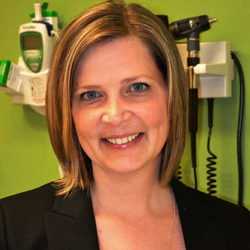In the Spotlight
Coralie Buhler
 Coralie Buhler is a nurse practitioner working in primary care. She is the clinical lead for the Quick Care Clinics in the Winnipeg health region. During her career, she has also worked with people in northern communities as a flight nurse, as a nurse educator for the airline, and a nurse practitioner in the emergency department.
Coralie Buhler is a nurse practitioner working in primary care. She is the clinical lead for the Quick Care Clinics in the Winnipeg health region. During her career, she has also worked with people in northern communities as a flight nurse, as a nurse educator for the airline, and a nurse practitioner in the emergency department.
Did you choose nursing or did nursing choose you?
A little bit of both. As a child, I had a Dr Seuss "about me" book. Under the section entitled "When I grow up I want to be . . . ", I had written "a nurse". Turns out, I knew at age four where my career path would take me.
My dad was diagnosed with terminal stomach cancer at the age of 39, and he has often spoken about one special nurse who happened to be working the night he received his diagnosis. After the doctor had left, and my mom had to return home to take care of my sister, brother and I, the nurse sat with him for hours. They talked and cried together throughout the night. He had not seen her prior to that night, nor after and even began to wonder if she were real, or if he had dreamt her. She had been the support he needed that night, and he began to refer to her as his angel.
She was real. She was a nurse who came to work, not anticipating what an important role she would play in one patient's life that night. It was then that I realized I wanted to be somebody's angel.
And have you been somebody's angel?
I have! As a student graduation from the BN program, my valedictorian identified me as her angel in her speech. But more importantly I have felt that connection with many patients over the years, and ever a special few who have been able to voice the feeling of this same connection.
When did you decide to become a nurse practitioner?
I've known I wanted to be a nurse practitioner since grade 11. I was home studying for exams and my dad called and told me to put on CBC because there was an interview I might be interested in. I did, and discovered they were interviewing two nurse practitioners from Ontario.
He was right - the nurse practitioner role offered the balance I was looking for, a nursing lens with the more in depth medical knowledge of the hows and whys I needed.
At the time I started nursing school, Manitoba didn't have a nurse practitioner program. By the time I finished my bachelor of nursing and the required two years of nursing experience, I was able to apply to the nurse practitioner program in Manitoba. I was in the second year for the University of Manitoba program.
Can you talk a little bit about your career path, and positions before this current one?
The nurse practitioner program is a two year Master's program including clinical and course work followed by a practicum project that resembled a thesis at the time. I needed to pay for school in between semesters, so I answered an ad in the newspaper for flight nursing.
I ended up flying for seven years as I loved it and the opportunities if afforded me. The schedule was nice - a week on, a week off allowing for some homework time, but I stayed long after I completed my Master's program because of the professional development the airline fostered. Along with the chance to work as a nurse educator for the airline, it also allowed me the chance to get a taste of the flavor for management when I covered for the director annually.
My first position as a nurse practitioner was in Health Sciences Centre (HSC) emergency. It was a steep learning curve, but when I thought about where to start as a nurse practitioner, I wanted people and resources around . . . what better place is there to learn as a novice nurse practitioner?
I was offered a manger position on a term basis. I worked on a two manager system for a three month term, which turned into nine months before I was offered a permanent position. That particular position is out of the scope of the Union at HSC, and as a result, if I accepted I would not be able to continue to see patients.
I was not ready to give up patient contact so together the management team and I brainstormed to see if I could make it work. Ultimately we couldn't find the right solution so I returned to my nurse practitioner role in emergency until I joined the Quick Care team in October 2014.
Can you explain to us what your current role is and what it involves?
I'm the clinical lead for the QuickCare Clinics in the Region, which offer unique services that have only been available for the past three years. Along with being in scope, the current position I'm in has a leadership component to it.
I help ensure best practice is being followed, and answer clinical questions for the primary care assistants, primary care nurses and nurse practitioners. I strive to be a source of support and a sounding board for them.
There are currently three QuickCare Clinics (McGregor, St. Mary's and Dakota), and they're managed centrally allowing us to work together as a team to best meet the needs of the public. For example, during the busy flu season this past December, we were able to support the system as a whole with extended hours, and staffing adjustments. We are constantly learning and adapting.
What is fulfilling about your work?
I want to do everything in my power to keep you out of the emergency room. The goal is to provide primary care to people outside of the hours their health care practitioner is available. Within that, we also do a lot of work around health prevention, education and health promotion.
My most fulfilling days are those that I feel I have been the right person to provide the most appropriate care for a patient, in a timely manner. This sometimes means helping them navigate our healthcare system, avoiding unnecessary time in emergency departments, and hopefully they leave feeling listened to and cared for.
Is this current position a good fit?
This role is a good balance of patient contact, staff support and administrative work for me. I have office space at 490 Hargrave and spend two days in the office, three days in the clinics. This schedule allows me to be available to staff for any clinical questions, as well as continue to see patients . . . which is the reason I went into this career in the first place.
My drive into work is my planning time. It's when I get excited about the surprises my day may bring - the clinical questions that may come up, the patients that I may see, and connections I get to make with people.
What do you want people to know about the nurse practitioner role?
I want the public to know about the nurse practitioner's scope, and the education that is required. It is a four year Baccalaureate degree -followed by at least two years practice before you can even apply for a Master's Degree with a focus on pathophysiology, diagnostic and pharmacology. This means at least an eight year process if you do it succinctly.
The nurse practitioner is prepared to manage acute episodic as well as chronic conditions. I continue to speak to the public around my ability to diagnose and prescribe without the direction of a physician. Even though the Masters of Nursing- Nurse Practitioner program has been graduating nurse practitioners in Manitoba for over 10 years, I still often get the questions "You can prescribe medication?" and "What doctor do you work with?"
The role of the nurse practitioner is so vast and varied, depending on your position. Basically the goal is to manage a person's health and wellness and everything that involves - requesting diagnostic testing, prescribing medication, diagnosing illness, helping people manage an illness or chronic health condition. The difference is that a nurse practitioner approaches a person's health and wellness with the unique lens that come with a nurse's perspective and experience.
What are your thoughts on nursing?
There are so many options in nursing - you can try things on until you find the place that fits you. I've admired nursing colleagues who are interested in different areas; it's a rare profession where you can find the place that challenges and excites you.
It's interesting how a path can unfolds. Getting a taste of administrative work and leadership in my flight nursing experience led to a management role, and now my clinical lead role.
What has had a profound influence on your nursing practice?
My family in general has influenced my nursing practice. They've been extremely supportive.
What gets you up in the morning?
My alarm clock. I wake up to an obnoxious noise - otherwise I would sleep right through it.
There is something empowering about approaching your work day with the confidence that you've got this, and you know you do what you do really well.
What are you challenged by?
I think my biggest challenges have been my feelings of wanting to meet everyone's expectations. There is a finite number of patients I am able to fit into a clinic day, and I struggle wanting to fit in "one more". I am improving, but have struggled to find a balance between what I need to do today, and what can wait until tomorrow.
At times in my career, I have been less balanced and very focused on work, answering my phone at all hours of the day and night - and my personal life suffered. Friends and family started telling me they missed me, they weren't seeing me, and all I was doing was working. It was a powerful wake-up call. Over the years I have learned the importance of this balance, and although sometimes I am better at it than others, I am improving. As a result, I am a happier and healthier person overall, able to give more to my friends, family, staff and patients.
